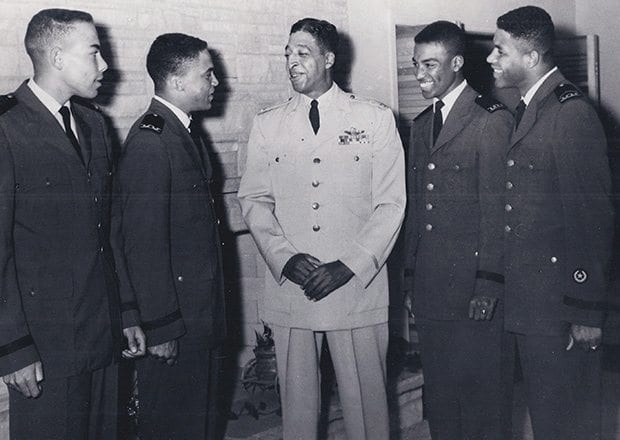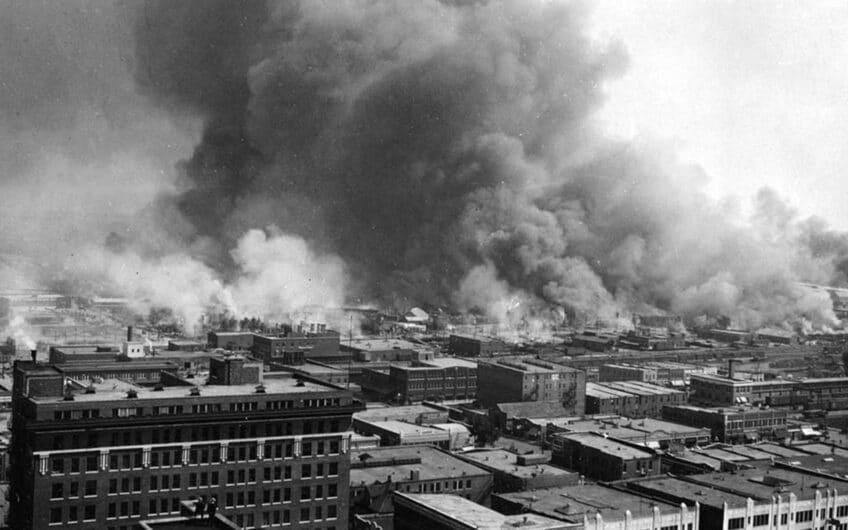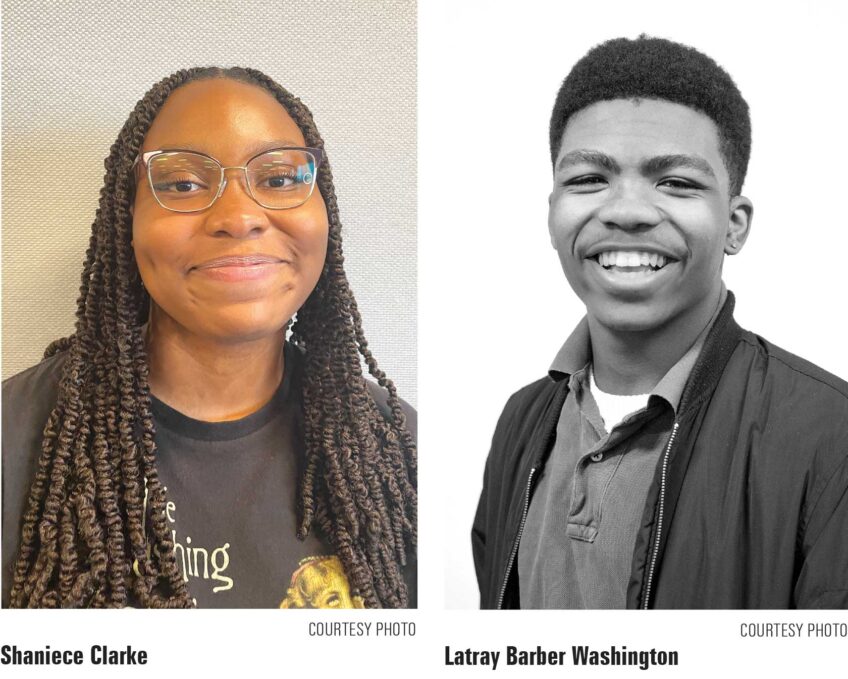A lesson in standing up from Col. Hubert “Hooks” Jones
Black History

Over the years, people around the nation have asked me what was it like to be a black cadet at the Air Force Academy; and they are right to do so since the experience at the time — forged in the midst of racial segregation and the Civil Rights Movement — was foreign to anything within my experience or culture. The situation certainly spawned a number of “interesting circumstances,” and none was more bizarre and instructive than the “Hooks Jones Story.”
The story begins in June just after the graduation of the Class of 1962. The new First Classmen from 1963 (which contained the first three blacks at the academy) were preparing to train the incoming Class of 1966; the Second Classmen from 1964 (which contained one black) were preparing to go to Europe, Asia, and Australia-New Zealand on their overseas field trip; and my Class of 1965 (which had five blacks remaining from the original six) — freshly free from its year-long shackles as doolies — was preparing for the Zone of Interior field trip.
The purpose of the six-week-long field trip was to give our class exposure to the operational U.S. armed forces with a week with the Navy, a week with the Army, and the rest of the time visiting Air Force units. While the trip was designed to be very interesting and motivational, at the time it began, we had already been away from home (including Christmas) for almost a year; and that understandable longing to get back to loved ones sometimes overshadowed the excitement of the adventure.
Because we were the largest academy class up to that point, the trip planners divided us into two 350-man contingencies — each of which were further broken down when necessary into smaller and more manageable groups. Group A (made-up of cadets from Squadrons 1 — 12) included two blacks, Bentley Plummer and Charlie Thomas; and Group B (which included cadets from Squadrons 13 — 24) had three blacks, including Robert Stroud, Arthur Beamon and myself.
We had become brothers over the year, and we sought out each other’s company and “hung out” together on a regular basis. The common culture, challenges, and quest of our people that we shared formed an unbreakable bond; and when we had any time off to relax, we generally spent it with each other — listening to R&B music, dissecting relationships with girlfriends, complaining about upper-classmen, and sharing career dreams. We all had mixed feelings as we embraced the first-rate learning conditions at the academy while our black collegiate counterparts were being vilified, spat upon, and worse at student-inspired sit-ins around the country.
America was a different place then. The U.S. Civil War had not yet been over for 100 years; and in many places in the country, the social issues over which the states bitterly battled had not yet been put to rest. Indeed, separate facilities for the races were the norm throughout the South, and discrimination and vituperation against the colored folks (as we were called back then when the “caller” was trying to be civil) were freely and openly displayed — biting exclamations to the hypocritically insidious American apartheid governing the nation.
Although we black cadets lived, worked, played, and prayed well outside of Dixie, the putrid malaise of racism permeated well beyond the Mason-Dixon Line. Still, while at or associated with the academy, our blackness was generally melded into the all-encompassing blue of the Cadet Wing.
Thinking that nothing sinister or dangerous lay before us on our Zone of Interior trip — as long as we stayed on-base (because a number of key military installations were located in the South) — I was somewhat surprised by the visit I received one afternoon before we departed by one of the Air Force officers who would be accompanying and supervising us. A major, he was the Air Officer Commanding of 21st Squadron, and apparently, as he and his colleagues meticulously planned our routes and routines, they learned that when the two groups of touring 65ers made their customary, week-long concurrent appearance with the Army at Ft. Benning in Columbus, Ga., the post would host a semi-formal, July 4th weekend dance for the visiting cadets.
As per usual, the young women for these affairs were invited from the local community, and the major and his colleagues had blanched at the thought of 700 southern belles attending an integrated dance on-post — not because they thought it was wrong, but because they did not want to offend the local populace. Accordingly, the major and his colleagues approached me with the idea — a request really — that so as to not put the academy, Ft. Benning and my white classmates in an embarrassing position, my black classmates and I would not attend the dance. Somewhat stunned by the request, I nevertheless kept my composure and told the major that I would talk the matter over with my classmates and get back to him.
I chuckled to myself as I called a “meeting of the brethren.” I explained the major’s “request” to the group; and we all laughed. The fact was that, just like most cadets, we hated going to those dances anyway! The genre was not of our black culture, and many whites felt the dances were a bit stodgy and archaic too. First of all, the music they played was straight out of the 1930s and 1940s — and the old music was compatible with the “old dances” that they taught us at USAFA like the foxtrot and the waltz.
We, on the other hand, were doing the twist, the cha-cha, the bop, the horse, the watusi, the swim, and the ever-popular slow-drag. Aside from the dances and the music, the “dates” procured for cadets at these dances were obviously not always selected for their grace or beauty. Indeed — and I am ashamed to say this now — but at each dance, awards would be made to the cadet having the ugliest date.
One of the more enterprising members of our group suggested that if we’re going to give up going to the dance, then we ought to get something out of it. Again, we laughed, because not going to the dance was reward enough! But we eventually came around to his way of thinking; and then Plummer suggested that we all get the weekend off and go home with him to Tuskegee, Ala., — a mere 50 miles away.
Not anxious to get off the military installation and delve any further into the Deep South, I was not at all sanguine about the idea. However, Bentley insisted that we could party hard over the weekend with good soul food and music — and, there would be girls — his girlfriend for one. Since we had not yet been home after 12 hard months at the Air Force Academy — and since we had an opportunity to get at least one of us home — we all agreed to the plan; and I was sent back to the major to cut the deal.
He carefully listened to my request for an “accommodation,” my leverage argument being that not only would we not go to the dance, but we would also not be on-post during the dance — thereby avoiding an embarrassing situation. He liked the idea, and took the matter up with his superiors. Our proposal was approved; and we were asked to be discreet in discussing the arrangement with our classmates. They didn’t want everyone asking for the special deal of skipping the dance and/or going home early.
Off we went on our excursion; and three weeks into the trip, both cohorts of the Class of 1965 arrived at Ft. Benning. After an exciting week “playing war” with the Army, Friday came, and we whisked away to our weekend to Tuskegee. Of course, our supervising Air Force officers knew what the deal was; and necessity required us also to share the facts with some of our classmates, who were answerable for our presence.
Indeed, it didn’t take long for the word to get around that “Hey, the black guys are getting the weekend off, and they don’t have to come to the dance!” The reaction of most of my white classmates that I talked to was how rotten it was that we were being made to miss a class function because of racial segregation — even the guys from the South said so, though they understood more than most the turmoil that would be caused by our presence. For the most part, we were envied for getting away to someone’s home before the rest of the Class could do it; having the weekend off with music, partying and home cooking; and most of all, missing a dance.
Before we left the post, we made sure to go to the bathroom so that we wouldn’t have to stop at an unfriendly, segregated facility while on the road. As we headed down the two-lane highway and passed the no-interior-plumbing wooden hovels, the shanty towns, and cotton fields along the road, my misgivings about travelling in the Deep South resurfaced. I thought about the lynchings, the violence, the backwardness and the danger enshrouding Dixieland; and I had second and third thoughts about leaving the safety of the post behind. Luckily, I also thought about Tuskegee as the home of Tuskegee Institute, Booker T. Washington, George Washington Carver and the renowned Tuskegee Airmen — heroes to blacks across the nation, and exemplars to black cadets at the service academies. Those thoughts made the ride easier; and after an hour, we pulled into town.
It was small, southern and rural — particularly the black side of town where we were headed. I could not imagine having a good time in this place. When we pulled up in front of a friend’s home, there on the front porch, chit-chatting about the events of the day were five of the most beautiful young women I have ever seen in one place at one time.
I couldn’t believe such pulchritude was available in this hick town! We bounded out of the car, made ourselves known, and socialized a bit. However, we soon had to resume our trip to Plummer’s house where we were staying. The young ladies said that they would see us later at the party. Plummer said don’t worry about leaving them — there were plenty more where they came from. And man was he right!
The people of Tuskegee could not have been more welcoming and hospitable. Many of them were around when the Tuskegee Airmen were in training there. To them we represented a new generation of accomplished black air cadets. Our uniforms and our military bearing evoked fond memories in the old folks and sparked new flames of adoration and respect in the younger ones.
I don’t mind telling you that we enjoyed the notoriety immensely as we went from house to house to meet and pay respect to the town’s black leadership. We all stayed with Plummer and his family and we visited with folks, ate and partied that Friday night, and looked forward to our weekend of fun.
Saturday morning was reserved for sight-seeing and visiting, and one of the last stops was the home of Col. Hubert L. “Hooks” Jones, the professor of air science at Tuskegee Institute. “Hooks,” a former the Tuskegee Airman who had stayed in the Air Force at the end of World War II, was a local legend in his own right. His warm welcome and beaming smile when we met spoke of the immense pride and respect he felt toward us as we carried forth his legacy.
He entertained and mesmerized us with stories of his military career — the planes he flew, the battles he fought, and the men he knew. We were well into the rousing conversation when he asked how we happened to be in Tuskegee. Then, with great satisfaction in our own cleverness, I related the entire story of how the major had requested that we not come to the dance, and we had leveraged that plea into a weekend in Tuskegee with partying, food, music and all of the pretty girls! We could not have been more self-satisfied with our wisdom and good fortune.
Suddenly, the smile left Hooks face as he stood-up in our midst and calmly said: “Gentlemen, You have to go back to Fort Benning and attend that dance!” At first, I thought he was kidding; and I laughed at the joke as I replied “Sir, I don’t think you understand. We hate going to those dances, and we were extremely fortunate to get out of this one. Besides, the major was right: Our presence at the dance would not be greeted happily by the City Fathers of Columbus, and we would put the base commanders, the Army, and the Air Force in an embarrassing position.”
Hooks then replied, “Son, don’t you see? Our people have been struggling for years for equality in the military and elsewhere; and the academy and the Air Force has to be made to stand up for the principle that all cadets, no matter their color or creed, are integral part of the Cadet Wing — an inseparable part of the whole. If some cadets can’t go to the dance, then none of them can go. We all must stick together!”
Feeling my resolve weaken in the face of his infallible logic, I nevertheless countered by saying “Sir, I cut the deal with the major and gave him my word — our word. I don’t want to be in the position of having now accepted the fruits of our bargain, and then later reneging on my part. He would be forever angry at us and make our lives back at the academy miserable.” Hooks, a “bird colonel,” immediately replied “Don’t you guys worry about a thing. I’ll take care of the major; and I’ll tell him that I ordered you to go to the dance — which I do!”
Hooks not only agreed to drive us to the dance, but to also help us obtain dates from among the damsels in Tuskegee. Being the pillar of the community that he was — and explaining the point-making situation as he did — it was not long before he had the cadres of beauties needed with semi-formal gowns in tow to provide each and every one of us with a date. We all piled into Hooks’ big station wagon, taking care not to muss the girls’ dresses; and I must admit that the close proximity with these gorgeously clad, perfumed misses made the trip to Ft. Benning less foreboding.
Hooks was resplendent as well in his beige, be-medaled, officer’s uniform with the pilot’s wings on front and the colonel’s eagles on his shoulders. He was a tall, moderately tan, imposing man with straight black hair, and an aquiline nose from which he derived his famous nickname. Although his demeanor was warm and nurturing when he was with us, there was nevertheless the air of confident authority when he wished to emphasize his point. As we drove past the guard post and to the building where the formal was being held, we could hear the music and see a few of our class- mates and their dates outside.
Hooks stopped the car, got out, and asked us to start unloading. While our classmates seemed unfazed by our presence and genuinely glad to see us, their dates did not appear to be quite so enamored. Someone must have gone to get the major, and he came outside to see what the commotion was all about. As soon as he saw us, he approached me with anger and concern and said, “What are you doing here? I thought we had a deal!”
Just then, Hooks interposed himself between me and the major and said, “It’s not his fault, major. I ordered them to come!” It was only then that the red-faced major noticed the tan-faced colonel and apologized to him as he pointed to us: “Sir, I’m sorry, I didn’t see you; and I don’t have any personal objections to their attendance here. But we’re guests of the Army; and we’re trying to get along with the customs of the local host population here in Columbus.” Hooks then pulled the major aside and firmly said, “Major, these men are part of the Air Force Academy Cadet Wing; and we — the Air Force — have taught them that the Wing and their fellow comrades-in-arms work, play and fight together. If some members of USAFA 1965 can’t come to the party, then none of them can come! Now, let’s go in.”
In we walked — tall, straight, and proud — just like Hooks, who led the way. People gawked at us — especially a few Georgia belles and some of the Army officers in attendance. We were warmly greeted by our classmates; and they graciously introduced us to their dates for the evening. Their ladies were equally gracious; and I don’t remember any type of incident ensuing from our presence.
Later on that weekend, as our classmates congratulated us for coming and suffering through the dance with the rest of the class, they said something that we all knew was true: We had the classiest and best-looking girls there! And as far as I know, there was never any mention at the Air Force Academy of segregating cadets on a racial basis ever again.
Thank you, Hooks, for the lesson — the logistical support — the love — and the legacy!
Fletcher H. Wiley is a lawyer, entrepreneur, activist, and political commentator.






